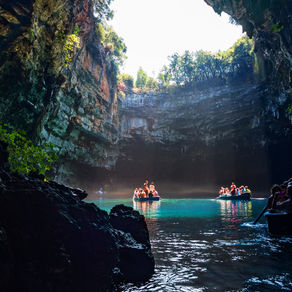Lake Stymphalia | Corinth | The Land of the Man-Eating Birds of the Sixth Labor of Hercules
- Shiny Greece
- Jan 3, 2020
- 3 min read
Updated: Mar 22
Authors
George - The Shiny Greece Team (feat. ai)
Nestled in the heart of the Greek countryside, at an altitude of 600 metres between the mountains Kyllini and Oligyrtos, and with a total surface of 3,5 square kilometers, lies a hidden gem known as Lake Stymphalia. This serene lake and its surrounding region have a rich history dating back thousands of years, and it has become a popular destination for both locals and tourists alike. In this article, we explore the history, ecology, and attractions of Lake Stymphalia, and why it should be on your must-visit list in Greece.

Lake Stymphalia | Photo by: iStock.com, ankarb
Lake Stymphalia History
According to Greek mythology, Lake Stymphalia was named after the Stymphalian birds, which were a flock of man-eating birds with sharp bronze feathers that resided in the surrounding mountains. The legendary hero Hercules was tasked with killing these birds as one of his Twelve Labors (the sixth). He succeeded by using a pair of bronze castanets given to him by the goddess Athena, which he used to frighten the birds into the air and shoot them down with his arrows. In reality, Lake Stymphalia has a much more scientific explanation. It is a freshwater lake located in the Corinthian Mountains of the Peloponnese, and it was formed approximately 500,000 years ago as a result of tectonic activity. The lake has played a significant role in the region's history, serving as a source of water for local communities, and has been mentioned in various historical texts dating back to ancient Greece.

Lake Stymphalia | Photo by: Nojos88, Limni Stymphalias 7, CC BY-SA 4.0
Ecology of the Lake
Lake Stymphalia is a wetland of international importance, as designated by the Ramsar Convention, due to its rich biodiversity and unique ecosystem, a Natura 2000 reserve with a wetland area and an agrarian area. The lake and its surrounding wetlands are home to numerous species of plants and animals, including several endangered and endemic species. The lake is also an important stopover site for migratory birds, making it a popular destination for birdwatchers. The Stymphalian wetlands have been recognized as a key area for the conservation of birds, and several conservation projects have been initiated to protect the area's avian inhabitants. The lake hosts the rare pelasgus stymphalicus fish, which has the natural ability to survive after the lake's drought, by entering and living inside the thick mud layer developed.

Stymphalia Corinth | Photo by: Panagiotis - The Shiny Greece Team
Attractions of the Lake
One of the main attractions of Lake Stymphalia is its natural beauty. The lake and its surrounding hills provide a picturesque backdrop for hiking, picnicking, and other outdoor activities. There are several hiking trails around the lake, ranging from easy to difficult, which provide visitors with the opportunity to explore the region's natural beauty. In addition to its natural attractions, Lake Stymphalia is home to several historical and cultural sites. The Stymphalia Archaeological Museum, located near the lake, showcases artifacts and exhibits from the region's rich history, including prehistoric and ancient Greek artifacts. The nearby monastery of Agios Georgios, dating back to the 17th century, is also worth a visit. Near the lake's shores, there are traces of the Arcadian city Stymphalos.

Lake Stymphalia in Winter | Photo by: Chris Kar, Limni Stymphalias 2, CC BY-SA 4.0
To Enthusiasts
The rich history, the unique ecosystem, and the natural beauty of Lake Stymphalia make it a must-visit destination for anyone traveling to Greece. Whether you're an avid birdwatcher, history buff, or nature enthusiast, there is something for everyone at Lake Stymphalia. So next time you find yourself in Greece, be sure to add Lake Stymphalia to your itinerary. You won't be disappointed!
































































A serene and enchanting destination with rich mythological history and beautiful natural surroundings, lush hills teeming with birdlife. A perfect spot for a peaceful day of birdwatching and exploring nature, and a must-visit for anyone interested in Greece's legends and stunning landscapes!
Great place, magic nature! Once there, you understand why there are so many different legends and myths!